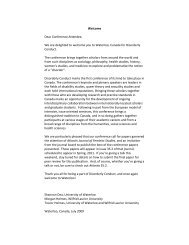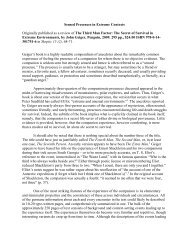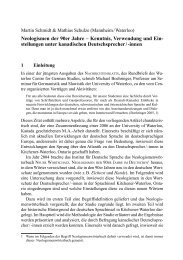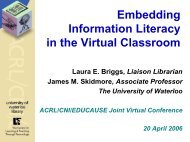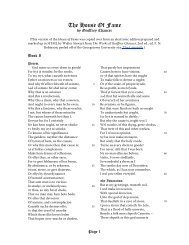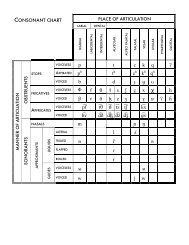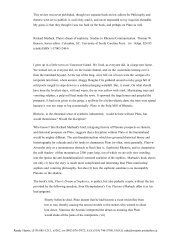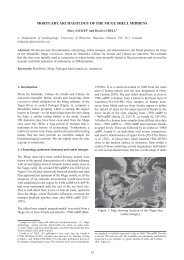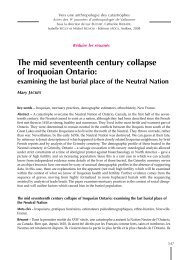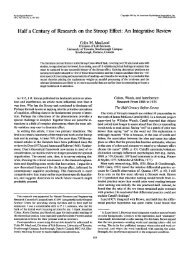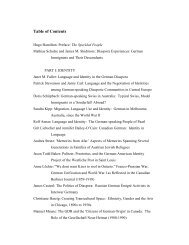Individual Differences in Learning and Memory: A Unitary ...
Individual Differences in Learning and Memory: A Unitary ...
Individual Differences in Learning and Memory: A Unitary ...
Create successful ePaper yourself
Turn your PDF publications into a flip-book with our unique Google optimized e-Paper software.
DIFFERENCES IN LEARNING AND MEMORY 535<br />
<strong>in</strong> that their male subjects showed slower scann<strong>in</strong>g with greater verbal<br />
ability. To add to the confusion, verbal ability <strong>and</strong> scann<strong>in</strong>g rate were<br />
unrelated <strong>in</strong> their female subjects! What are we to make of this?<br />
For the present, the evidence seems to suggest little relationship be-<br />
tween STS scann<strong>in</strong>g <strong>and</strong> ability measures <strong>in</strong> the normal range. Perhaps, as<br />
Hunt (1978) suggests, a more dem<strong>and</strong><strong>in</strong>g search task would reveal a more<br />
reliable pattern. One might consider, for example, a version of the “trans-<br />
lation” scann<strong>in</strong>g paradigm developed by Cruse <strong>and</strong> Clifton (1973). Still, it<br />
may be that search<strong>in</strong>g STS is simply not a locus of <strong>in</strong>dividual differences<br />
<strong>in</strong> memory. If so (<strong>and</strong> we must await clarification), this will be an impor-<br />
tant f<strong>in</strong>d<strong>in</strong>g. In any study of <strong>in</strong>dividual differences, it is important not<br />
simply to f<strong>in</strong>d differences, but to f<strong>in</strong>d an orderly pattern of differences.<br />
F<strong>in</strong>d<strong>in</strong>g no difference on some task assures us that our observed differ-<br />
ences are not due to some unknown general factor that will produce a<br />
difference <strong>in</strong> any task. By the same logic, f<strong>in</strong>d<strong>in</strong>g some process that is<br />
<strong>in</strong>dependent of a particular ability permits us to elim<strong>in</strong>ate from considera-<br />
tion some theoretical accounts. Certa<strong>in</strong>ly, this is a fundamental goal of<br />
study<strong>in</strong>g <strong>in</strong>dividual differences.<br />
Control Processes <strong>in</strong> Short-Term Store<br />
In the orig<strong>in</strong>al Atk<strong>in</strong>son <strong>and</strong> Shiffr<strong>in</strong> (1968) model, the nature of control<br />
processes (apart from rote rehearsal) was left unspecified. S<strong>in</strong>ce the levels<br />
of process<strong>in</strong>g framework was proposed (Craik & Lockhart, 1972), control<br />
processes have been emphasized <strong>in</strong> memory research, generally with<strong>in</strong><br />
the <strong>in</strong>cidental learn<strong>in</strong>g paradigm. However, there has been little empirical<br />
<strong>in</strong>terest <strong>in</strong> how <strong>in</strong>dividuals differ <strong>in</strong> these processes, despite some sugges-<br />
tive historical precedents (e.g., Plenderleith & Postman, 1957). Perhaps<br />
because of the qualitative effects sought <strong>in</strong> most of the current research<br />
(<strong>and</strong> the measurement problems <strong>in</strong>volved <strong>in</strong> compar<strong>in</strong>g performance<br />
across different <strong>in</strong>cidental tasks), the additional problems <strong>in</strong>volved <strong>in</strong><br />
exam<strong>in</strong><strong>in</strong>g <strong>in</strong>dividual differences have seemed too great. Yet <strong>in</strong>dividual<br />
differences relationships need not be quantitative, as theoretical notions<br />
rely<strong>in</strong>g on “moderator variables” (cf. Wigg<strong>in</strong>s, 1973) certa<strong>in</strong>ly demon-<br />
strate.<br />
Given the large number of potential control processes, where should<br />
one beg<strong>in</strong> search<strong>in</strong>g for <strong>in</strong>dividual differences? Possibly, the ability to<br />
choose an optimal control process <strong>and</strong> to implement it effectively could be<br />
a source of differences. If so, we should look for this superord<strong>in</strong>ate ability<br />
before focus<strong>in</strong>g on <strong>in</strong>dividual subprocesses. Consider for example a con-<br />
cept that might be calledflexibility of <strong>in</strong>formation process<strong>in</strong>g. Exactly this<br />
sort of idea has appeared <strong>in</strong> two recent reports, one from the attentional<br />
doma<strong>in</strong> <strong>and</strong> one from the verbal learn<strong>in</strong>g tradition.2<br />
* It is worth po<strong>in</strong>t<strong>in</strong>g out that similar concepts have been put forth <strong>in</strong> the doma<strong>in</strong> of<br />
personality differences related to memory. Both Mueller (1979), <strong>in</strong> discuss<strong>in</strong>g anxiety, <strong>and</strong>



